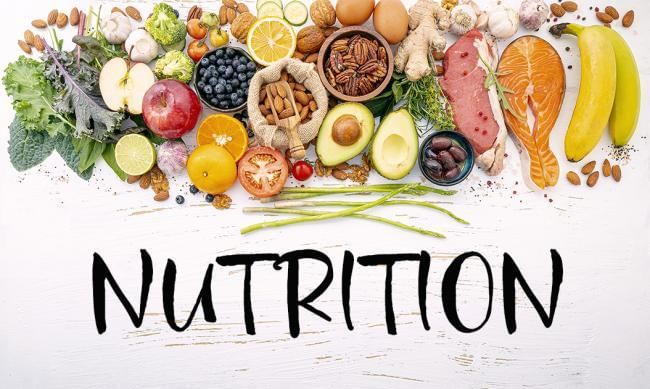Revision Notes: Nutrition | Biology Class 9 ICSE PDF Download
Nutrition

Nutrients are the essential components of our food that are necessary for the body. They act as fuel and are oxidized to produce energy, which is crucial for carrying out various life processes. Nutrition involves supplying the body with essential organic and inorganic chemical compounds such as proteins, carbohydrates, minerals, vitamins, etc. Nutrition is essential for growth, repair, energy, maintenance, and protection of the body.
Classes of Nutrients
Nutrients are substances that provide nourishment essential for the maintenance of life and for growth. Nutrients are of two types: (a) Macronutrients (needed in large quantities) (b) Micronutrients (needed in small quantities)
Macronutrients
(i) Carbohydrates
- Sources: Cereals such as wheat, rice, maize; potatoes; sugar; honey; fruits like bananas, melons, and papayas.
- Function: Provide energy.
- Nutritional Disorders: Deficiency can lead to weakness and stunted growth, while excess can cause obesity.
(ii) Fats
- Sources: Butter, ghee, milk, cheese, oils, egg yolk, meat.
- Function: Provide twice as much energy as carbohydrates.
- Nutritional Disorders: Deficiency can cause Phrynoderma, while excess can lead to atherosclerosis.
(iii) Proteins
- Sources: Milk, pulses, peas, beans, chicken, fish, eggs, cheese.
- Function: Essential for growth and repair of the body.
- Nutritional Disorders: Deficiency can lead to Kwashiorkor and Marasmus.
(iv) Dietary Fibres/Roughage
- Sources: Plant products, whole grains, pulses, fresh fruits, and vegetables.
- Function: Add bulk to food and help eliminate undigested food.
- Nutritional Disorders: Deficiency can cause difficulty in stool formation.
(v) Water
- Sources: Liquid water and food items like tomatoes, melons, cabbage, and lettuce.
- Function: Helps absorb nutrients, transport and regulate substances within the body, and eliminate wastes through urine and sweat.
- Nutritional Disorders: Impairment in bodily functions.
Micronutrients (needed in small quantity)
(i) Minerals
Minerals are compounds found in nature that are required for various biochemical reactions in the body. Some important minerals include:
- Calcium: Found in dairy foods, beans, and cabbage. It is essential for bone and enamel formation, muscle contraction, and blood clotting. Deficiency can lead to rickets and poor skeletal growth.
- Sodium: Found in table salt. It helps regulate acid-base equilibrium. Deficiency can cause muscular cramps.
- Potassium: Found in bananas, potatoes, and citrus fruits. It is important for nerve and muscle activity, fluid balance, and secretion of acetylcholine. Deficiency can disrupt nerve impulse transmission.
- Phosphorus: Found in dairy products, cereals, beans, nuts, meat, and eggs. It is involved in the synthesis of nucleic acids, ATP, NADP, and is important for bones and enamel, muscle contraction, and nerve impulse conduction. Deficiency can lead to soft bones.
- Magnesium: Found in vegetables, whole grains, nuts, seafood, and meat. It is important for bone and tooth structure and enzyme synthesis. Deficiency can increase nervous system irritability.
- Sulphur: Found in dairy products, onions, garlic, radishes, meat, and eggs. It is a component of proteins and co-enzymes. Deficiency can cause skin problems.
- Chlorine: Important for water balance and secretion of HCl in gastric juice.
(ii) Vitamins
Vitamins are organic substances required by the body in small quantities to maintain good health. Some important vitamins include:
- Vitamin A (Retinol): Found in butter, egg yolk, liver, milk, carrots, leafy green vegetables, yellow fruits, and fish liver oils. It promotes growth, resists infection, and is a component of visual purple in retinal cells for image perception. Deficiency can cause night blindness and xerophthalmia.
- Vitamin D (Calciferol): Found in fish liver oils, milk, and eggs. It is produced in the skin by exposure to sunlight and helps the body use calcium and phosphorus for bone and teeth formation. Deficiency can lead to rickets in children and osteomalacia in adults.
- Vitamin E (Tocopherol): Sources: Vegetable oils, nuts, seeds, and green leafy vegetables.
Nutritional Components of Diets
Meat, milk, whole wheat
- Prevents oxidation of vitamin A
- Sterility in rats
K (Phylloquinone)
- Green leafy vegetables, especially cabbage and spinach
- Needed in normal clotting of the blood
- Haemorrhage
Water-Soluble Vitamins
B1 (Thiamine)
- Whole grains, yeast, liver, eggs, and lean meat
- Increases growth and appetite, helps in digestion and functioning of the nervous system
- Beriberi
B2 (Riboflavin)
- Eggs, liver, milk, yeast, green vegetables
- Regulates oxidation of food
- Irritation in eyes and skin, intestinal disorders, inflammation of the tongue
B3 (Niacin)
- Lean meat, liver, milk, eggs, groundnuts, whole grains
- Promotes health of the skin and the nervous system
- Pellagra, dermatitis, loss of memory, diarrhoea, skin lesions, rashes
B5 (Pantothenic acid)
- Mushrooms, sweet potato, lentils etc.
- Breakdown of fats and carbohydrates, production of red blood cells
- Fatigue, loss of coordination
B6 (Pyridoxine)
- Meat, fish, eggs, cereal bran
- Inter-conversion of amino acids
- Skin problems, nerve disorders
B11 (Folic acid)
- Liver, leafy vegetables
B12 (Cobalamine)
- Liver, meat, milk, cereals, pulses
- Normal functioning of red blood cells
C (Ascorbic acid)
- Fresh citrus fruit (lemon, orange, grape fruit), tomatoes, germinating seeds
- Promotes functioning of capillary walls
- Increases susceptibility to infections, scurvy
Balanced Diet
- A diet that contains all the essential food components in the right quantities is known as a balanced diet.
Malnutrition
- Malnutrition occurs when a person lacks or is deficient in one or more essential food elements.
|
18 videos|101 docs|19 tests
|





















